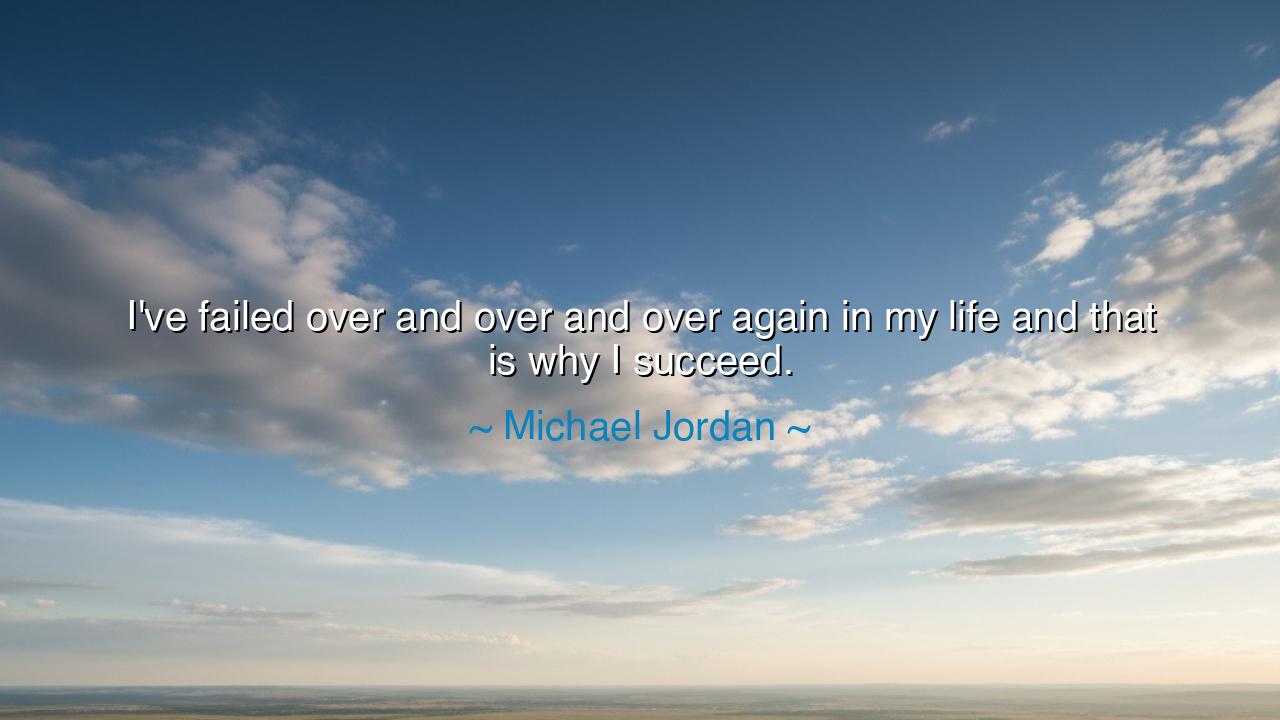
I've failed over and over and over again in my life and that is






The words of Michael Jordan, “I’ve failed over and over and over again in my life and that is why I succeed,” ring like the echo of a bronze bell struck in the temple of time. They are not merely the boast of a champion but the confession of a mortal who embraced his wounds until they became his strength. In these words is woven the truth of human endeavor: that failure is not the tomb of greatness, but its cradle. The hero does not rise because he never fell; he rises because he refused to remain on the ground.
Consider the weight of those words: “over and over and over again.” They are not the admission of one misstep, nor the apology of a man defeated by chance. They are the testament of countless struggles, of missed shots, of games lost, of nights when sweat poured down like rain upon the earth, and still the fire within did not go out. Jordan, revered by many as the greatest to touch the game of basketball, speaks here not of triumph, but of the path through hardship, a path every seeker of greatness must tread.
The ancients knew this truth well. Did not the mighty Odysseus wander ten years upon the seas, battered by storms and trials, before he could reclaim his home? Did not the sculptor, chiseling at marble, strike away countless fragments before the hidden form of beauty emerged? So too with Jordan: his victories were not born from ease, but from the furnace of relentless discipline, where every defeat was a lesson, every error a stepping stone.
Let us remember also the tale of Thomas Edison, who when asked about his thousands of failed attempts at creating the light bulb, declared, “I have not failed; I have found ten thousand ways that do not work.” Like Jordan, Edison embraced the sting of failure, not as shame, but as knowledge earned. In their struggles lies the great harmony: genius and greatness are forged not in the absence of error, but in the embrace of error. The fire that tempers steel must burn hot, and the blows of the hammer must be endured if the sword is to be sharp.
This is the heart of the teaching: failure is the teacher of success. Without it, the taste of victory is shallow, the skill untested, the soul untempered. The one who flees from failure flees also from mastery, for to succeed is to endure a thousand small deaths of pride and certainty until at last wisdom is born. The ancients spoke of the phoenix that must burn in flames before it can rise anew; so too must we burn in the fires of our own mistakes to rise with greater wings.
To those who hear these words, let them not be empty echoes but guiding stars. When your plans crumble, when your voice falters, when your strength fails, do not curse your weakness. Instead, stand as Jordan stood, with eyes unbowed, declaring that each stumble is part of your ascent. The lesson is this: you succeed not because you avoid failure, but because you learn to walk with it, wrestle with it, and transform it into strength.
And so, take practical steps in your own life. When you fall, write down what brought you down, and let that knowledge sharpen you. When you miss your mark, return to practice with greater resolve. When doubt whispers in your ear, remember the stories of Jordan, of Edison, of Odysseus, and of all who rose from ashes to glory. Make failure your companion, not your enemy. Set your hand once more to the work, and again, and again, and again. For it is only in the endless return to effort that success reveals itself.
Thus, let the words of Jordan live within you: “I’ve failed over and over and over again in my life, and that is why I succeed.” In them is not despair, but triumph; not defeat, but a battle hymn for every soul that dares to strive. Let this truth guide your steps, so that when your own tale is told, it may be said: here was one who fell, and yet rose higher because of it.






AAdministratorAdministrator
Welcome, honored guests. Please leave a comment, we will respond soon